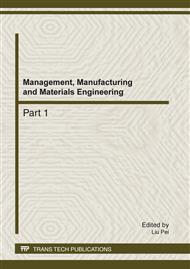p.264
p.269
p.274
p.278
p.282
p.289
p.294
p.299
p.307
Supply Chain Network Equilibrium Model Based on Corporate Social Responsibility with Multicriteria under the Revenue-Sharing Contract
Abstract:
This paper developed a three-level supply chain network equilibrium model with multi products and multicriteria based on corporate social responsibility through integrating the maximization of economic benefits, the maximization of social utility and the minimization of environment pollution under revenue-sharing contract. We analysed competitive behaviour of manufactures and retailers in a no cooperative competitive and described the multicriteria decision-making behaviour using Nash equilibrium theory and the weighted value function. Using product utility functions of brand differentiation and consumer preferences from product price, transaction cost and corporation social responsibility to analyse product choice in a market, and we developed the optimization conditions of each tier and whole network by variational inequality method. At last we illustrated the model with several numerical examples.
Info:
Periodical:
Pages:
282-288
Citation:
Online since:
January 2012
Authors:
Price:
Сopyright:
© 2012 Trans Tech Publications Ltd. All Rights Reserved
Share:
Citation:


